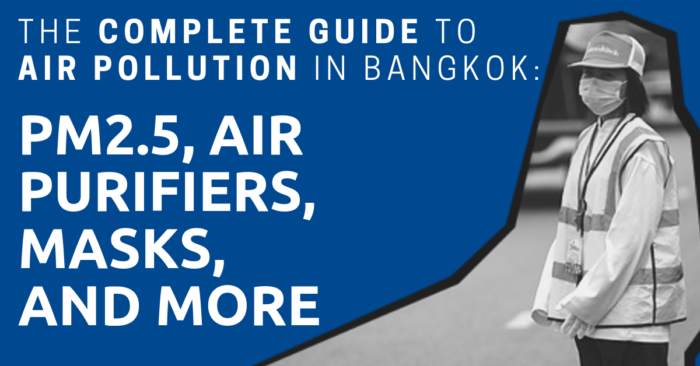
I’m sure you’ve heard it. The pollution in Bangkok can be bad–really bad.
So bad, in fact, that the government is thinking about seeding the clouds to make it rain and knock down some of the pollution floating around.
I don’t know about you, but this worries me. Especially since I have two young kids.
My wife and I have been finding out ways to limit our exposure to the pollution, or PM2.5.
What is this PM2.5 that everyone’s talking about anyway?
I thought I’d share our tips and resources with you so that you can better protect yourself and your family.
If all you are looking for is a recommendation for place to buy air purifier, I’d recommend you get it from WEDO AIR.
"*" indicates required fields
Disclaimer: This article may include links to products or services offered by ExpatDen’s partners, which give us commissions when you click on them. Although this may influence how they appear in the text, we only recommend solutions that we would use in your situation. Read more in our Advertising Disclosure.
Contents
What is PM2.5?
PM2.5 is any particle in the air that measures less than 2.5 microns. So the pollution itself isn’t PM2.5, it’s the size of the pollution that’s referred to as PM2.5.
You need to worry about this because this is the size of pollution that can get past nose hairs, into the lungs, and possibly into the circulatory system.
The particles are so small that about 40 of them can fit around the diameter of one human hair.
If you want a more scientific explanation of PM2.5, check out this article.
When Does It Happen?
Air pollution is likely to be a regular event in Bangkok during the cold season from November to February.
During this season, there’s a change in air pressure in the entire country. This results in less wind to blow away air pollution caused by cars, construction, and factories.
In the end, the pollution gets locked up in many parts of Thailand and creates health problems until the summer, when the wind starts blowing again.
During November to February, the price of masks and air purifiers are expected to significantly increase.
During the air pollution period, you may need to pay more than 6,000 baht to get an air purifier and wait for more than 2 weeks for it to ship.
In case you don’t have one yet, it’s better to stock up on air purifiers, filters, and masks before the air pollution hits Bangkok again.
Where PM2.5 Comes From
PM2.5 comes from many sources in and around Bangkok, although the exact cause is still unknown.
Some experts believe the pollution is mostly from the following:
Agriculture and Industry
Thailand is still a slash and burn society. Each year during the cold season, farmers burn their fields to destroy weeds and prepare for the seeding season.
Air pollution also comes from factories and power plants.
Although pollution from field burning and factories and power plants doesn’t happen in Bangkok, air currents blow pollutants from surrounding provinces into Bangkok.
Construction
Bangkok is expanding the BTS and MRT lines all over the city. With all the contraction going on, it’s putting a lot particles in the air
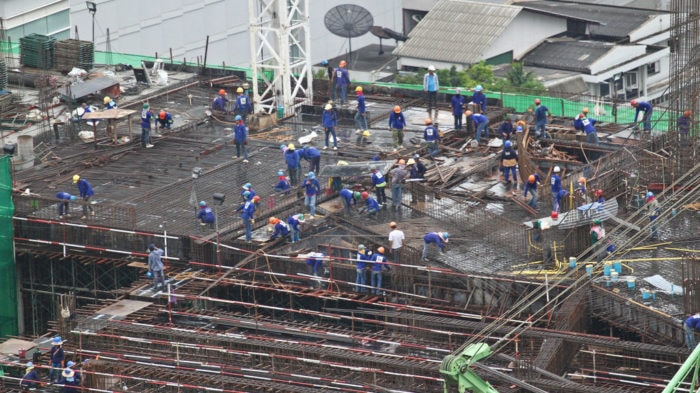
Traffic
Bangkok is known for its heavy traffic. With construction happening all over the place, narrowing roads and detours cause gridlock, and cars release more CO2 into the air.
Old Vehicles
A majority of buses in Bangkok have been in operation for over 20 years. The engines are no longer in a good condition and release smog everywhere they go.
And this smog doesn’t only come from buses, but construction trucks, cars, and tuk-tuks.
Dangers of PM2.5
If you’re exposed to PM2.5 for long periods of time, you could wind up with a list of premature health concerns ranging from asthma to cancer and everything in between.
The unfortunate part about this is that “long-term exposure” isn’t really defined. Reports define long-term exposure as anywhere from months to years.
But here’s what Dr. Gerard Lalande, author of Stay Health in the Asian Tropics and Chief Medical Officer of Luma Health, said when we asked for his input on 2.5PM exposure time:
I believe there is a scientific and medical consensus on the harmful effects of fine PM as well as a definitive evidence that children, elderly and at-risk individuals are more prone to be affected.
2.5 PM have also been implicated in abnormal evolution of pregnancy as well as impacting negatively on the health of the children born from women exposed to air pollution during the pregnancy.
It is worth to highlight that there is no evidence of a safe level of exposure or a threshold below which no adverse health effects occur.”
Here are some of the health risks you can face if exposed to PM2.5. The AQI Level stands for Air Quality Index Level, or the amount of PM2.5 in the air.
I show you how to find the levels of PM2.5 in your area in the How Polluted is Your Area? section.
| AQI Level | Health Descriptor | Meaning |
| 0 – 50 | Good | Satisfactory-little or no risk |
| 51 – 100 | Moderate | Acceptable-health concerns for sensitive people |
| 101 – 150 | Unhealthy for Sensitive Groups | Dangerous to children and adults with lung disease or other respiratory issues |
| 151 – 200 | Unhealthy | Dangerous to everyone |
| 201 – 300 | Very Unhealthy | Dangerous to everyone with noticeable health effects |
| 301 – 500 | Hazardous | Emergency conditions-everyone will be affected |
Checking Air Quality in Bangkok
You may not know it, but you could be living in one of the most polluted spots of Bangkok. But there are a few easy ways to check your area:
- Websites
- Apps
- Monitors
Air Quality Index Websites
Below are three air index websites that you can use to check the quality of air in Bangkok. It’s best not to rely on one single website, but rather check out all three to be sure of their accuracy.
Aqicn.org
Aqicn.org gathers air quality data from five different sources to calculate the amount of PM2.5 in Bangkok’s air. They also give a seven-day air quality forecast based on previous data.
IQAir AirVisual
IQAir AirVisual gathers their air quality data from 15 different sources to calculate the amount of PM2.5 in Bangkok’s air.
They also offer a wide range of other data, including hourly PM2.5 forecasts, historical data, and seven-day forecasts.
You can even select a location closest to you to get the most accurate readings.
Air Quality Index and Visual Apps
If you have to go outside, leave your house when air quality is at its best. This way you can see what the air quality is like where you live and plan your trips outside accordingly.
IQAir AirVisual App
IQAir AirVisual (mentioned above) has an app for iOS or Android. It’s a handy app that lets you select the nearest location to you and gives you up-to-the-second updates on the air quality in your area.
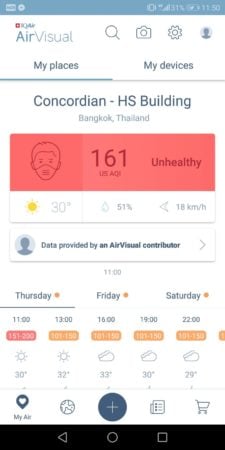
As you can see from my screenshot, we’ve been living in one of the most unhealthiest areas. The scary part is that we weren’t even aware of this until we downloaded the app.
We’re now starting to wonder if this has led to my youngest daughters allergies, and it’s why we’re moving in March.
Air4Thai
Air4Thai is another app for iOS and Android that gives you up-to-second updates on the air quality in your area, but it doesn’t use any outside sources to help them gather their info.
Air4Thai shows very low readings compared to IQAir AirVisual, which has led to concern for some Thai netizens. Or is that IQAirVisual boosts up their readings because they’re selling PM2.5 monitors?
Air Quality Monitors
If you want to monitor your house for PM2.5, or take a monitor on the go in your car. If you don’t mind about the brand, you can buy PM2.5 monitor online at less than 2,000 baht online.
Here are a few monitors that could help you.
Smart Air Quality Monitors
Smart Air has a portable PM2.5 monitor for 3,990 baht. It can track PM2.5, PM10, CO2, temperature, and humidity. The Smart Air Monitor can be recharged with a USB-C and can connect to the Apple Home or Xiaomi App.
IQAirVisual
The IQAirVisual monitor goes hand-in-hand with their app and website. In fact, when you get one of their monitors you can opt to send results to their website, so that people in your area can see the PM2.5 levels as well.
This monitor will cost you $339–not cheap.
Other
Lazada has a list of PM2.5 monitors for sale but the lack of reviews makes buying one a roll of the dice. Prices range from 650 baht to over 3,000 baht.
How to Protect Yourself Outside
Now that you know what PM2.5 is, where it comes from, and the dangers of being exposed to it, let’s look at how to protect yourself from it.
You can’t just barricade your family indoors. So here are a few things you can do to limit your exposure to pollution outdoors.
Masks
You might feel like you’re living in End of Days, but wearing the proper mask will reduce the amount of pollution that enters your lungs.
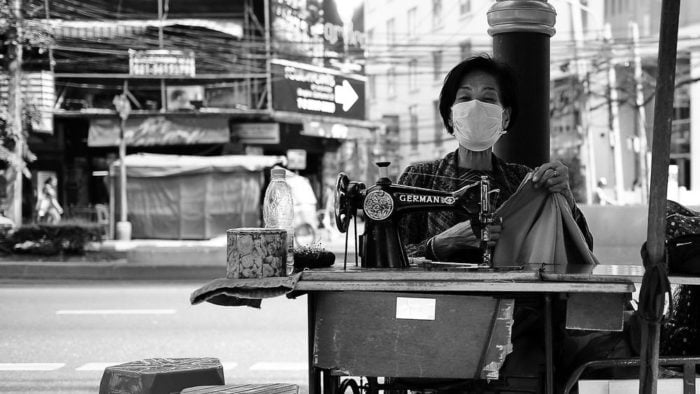
To find out why KN95 masks are important, or which masks you can use in their place, read this article by the World Air Quality Index.
But in order to work, masks must fit tightly and be rated to filter PM2.5.
Surgical masks will work but not as good as masks rated to filter PM2.5 because they don’t fit snug around your face, which means you’re breathing in unfiltered air through the gaps.
3M FFP3 Masks
When it comes to masks that filter out PM2.5, 3M 9332 masks are always the top performing masks available. They can remove over 99.6% of PM2.5.
I haven’t seen these masks for sale in Bangkok. But you can order them on Lazada.
3M KN95 Masks
Your next best option is the 3M KN95 masks. You can find these at 7-11 or Tops Market. They come in a blue and white box. These masks remove 97.5% of PM2.5 in the air.
You need masks like 3M’s KN95 mask or equivalent. You can buy KN95 masks online. But when pollution is at its worst they sell out quickly.
Surgical Masks
If you can’t find masks rated to filter PM2.5, you can use surgical masks. But surgical masks won’t filter as much PM2.5 because they don’t fit snugly around your face.
Reports show that surgical masks can remove up to 60% of PM2.5 in the air entering your body. In a bind, surgical masks are better than nothing.
Surgical masks rarely sell out. You can find them at any convenience store or pharmacy in Thailand.
It’s best to stock up on 3M masks so that you have them when you need them. Or you can order them online. My wife just found some 3M masks on Lazada and had them delivered within 24 hours.
How to Protect Yourself Inside
We can’t control everything that’s happening outside of our homes, but we can control what’s happening inside.
Here are a few ways to reduce the amount of pollution getting in your home.
Invest in Air Purifiers
When it comes to air purifiers, don’t buy anything other than a HEPA air purifier.
Other systems may claim to be better, but research shows that HEPA systems are the absolute best for removing pollution particles from the air.
Although expensive, HEPA air purifiers can significantly reduce the amount of pollution in your home. And you don’t even need a top-of-the-line purifier.
Air Purifier Reviews
We have a separate article on how to choose a good air purifier in Thailand.
In short, you can get an air purifier from WEDO AIR. They have various models for different room sizes. The cheapest model starts at 3,800 baht and can clean air upto 40 sqm.
Another popular air purifier you can get in Thailand is from Xiaomi. You can order it from Lazada. It usually takes just a few days to deliver.
Note that the cost of air purifiers and masks tends to significantly increase when Bangkok has an air pollution problem.
The increase was almost 100% of the normal price in the last few years. And sometimes, they’re out of stock.
So if you plan to live here, it’s better to get one yourself before the price increases.
If you’re looking for a general overview of air purifiers on the market, and you don’t mind shipping on into Thailand, you can check out WireCutter’s review of air purifiers.
You might not be able to buy some of the air purifiers on their list, but you’ll know which specs they used to review each one, and then be able to look for those specs on air purifiers in Thailand.
Where to Buy
In Bangkok, you can buy air purifiers on- or offline. Some places may offer a better selection than others. So be sure to check around.
WEDO AIR
Karsten, founder of ExpatDen, uses a WEDO AIR purifier which can be bought directly from their website. Their no-frills-get-the-job-done-purifiers are available for less than THB 4,000 and filter replacements cost around THB 600 (with other brands charging more than THB 2,000 for filters, which you are supposed to change every 6 months).
Lazada
Lazada sells a variety of air purifiers as well. But they tend to sell out when pollution gets really bad in Bangkok.
Home Pro
If you’re looking for a one-stop place to pick up a purifier, check out Home Pro’s selection of air purifiers. They carry a variety of air purifiers for all budgets. One downside is that those are probably the first ones to sell out when pollution hits, so be sure to call ahead to check if the shop has any in stock.
Central
Central Mall is the official retailer of Blue Air Purifiers in Thailand. Blue Air is one of the most recommended brands according to Wire Cutter. You can buy air purifiers through Central’s online shop. Central though is definitely on the pricier side of things when it comes to air purifiers.
Sizing Air Purifiers
The size of air purifier you need depends on the size and layout of your living space.
If you live in an open floor plan, you can get away with buying one large air purifier. But if you live in a space with many closed-off rooms, you need to buy smaller air purifiers for each room.
In order to get the right sized purifier, you need to calculate the square footage of the space you intend to keep the purifier in. Then you’ll compare that number to the rating on the purifier.
The general rule of thumb is to buy an air purifier rated for 20% larger than the space you need to purify.
So if your studio apartment is 750 square meters, you’d need an air purifier rated for 900 square meters.
If you buy an air purifier that is slightly oversized, you’re purifier won’t run as much, saving you costs on electric.
DIY Air Purifiers
Some people have made purifiers using fans and HEPA filters that have worked just as well as brand name purifiers.
If you search DIY HEPA air purifiers on YouTube a list of videos will come up.
Although the guy in this video is selling these homemade HEPA air purifiers, you can get HEPA filters and floor fans–the two materials needed–at Home Pro or Thai Watsadu.
Close Windows and Doors
You might like to open the doors and windows early in the morning to clear the stagnant air out your home or enjoy the crossbreeze instead of kicking on the ac.
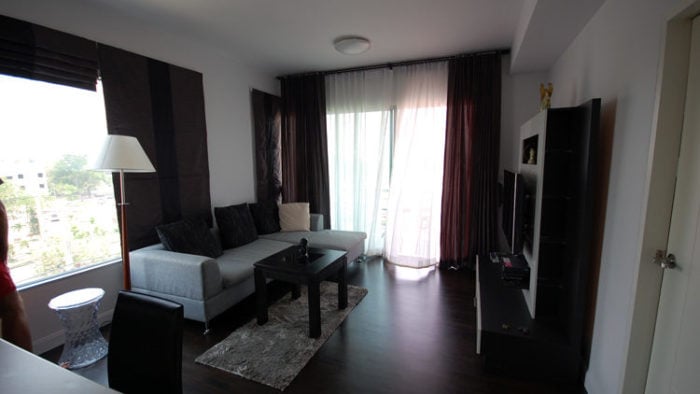
But by doing this you’re letting pollution into your living space.
It’s best to keep all windows and doors closed when PM2.5 readings are at unhealthy levels.
Keep Plants
Neither my wife nor I have green thumbs. Most plants we buy, die. But after I came across this TED talk about how to create clean air in your home, I thought I’d give plants another shot.
The three plants mentioned in the short video are:
- Areca Palm
- Mother-in-Law’s Tongue
- Money Plant
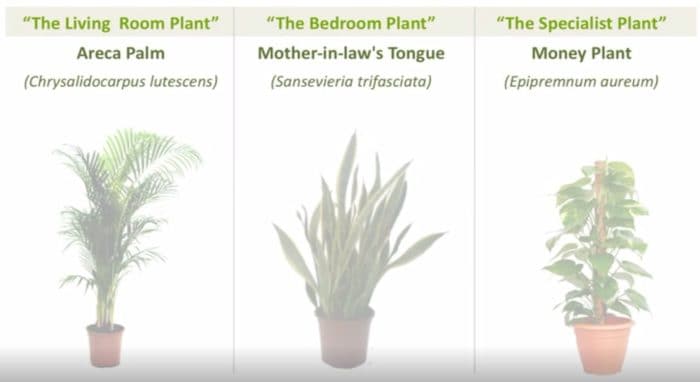
These plants are all available at local Thai garden centers. They help filter the air and they produce oxygen.
But you have to buy them according to how many people are in your home. So watch this four-minute video and take notes to get the full benefits of these plants.
How’s About Other Province
Other provinces also have air pollution problems during November to February. But it was not as bad as in Bangkok, except for some provinces in the north, including Chiang Mai and Chiang Rai.
In Chiang Mai, the air quality level during the cold season can be worse than Bangkok. The worst part is that it lasts until April.
The air pollution problem is worse in provinces like Chon Buri, Samut Prakan, and Samut Sakron where there are many factories.
The good news for those who live in the beach destinations in the Southern Part of Thailand including Suratthani, Hua Hin, and Phuket is that you are unlikely to be affected by the air pollution. It is always windy there.
Now, on to You
No matter which steps you take, be sure to protect yourself and your family. No one is sure how long this pollution in Bangkok is going to last, but let this guide be the beginning to your pollution preparation.
To prepare yourself, it’s better to invest in an air purifier. You will need it. You can buy it online.
If I’ve forgotten to add any resources, or if you have any tips or techniques to stay healthy from the pollution in Bangkok, share your advice with our community in the comments section below.
Featured image courtesy of Scotty_. Other images courtesy of octal, danebrian, 71267357@N06, and noshit-mag.




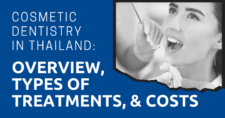
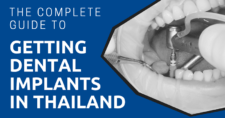

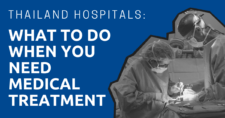
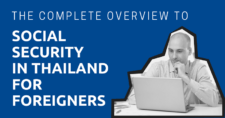
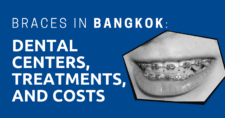
In the three weeks visit to Bangkok last February I used to constantly walk and being exposed to the sun and felt the effects of pollution in my skin. Sunscreen with moisturizer did not help much the facial irritation. Anyway, I love Thailand and hope once the road constructions end the air quality will improve.
Hey John, Kang Wei here! I’m an engineer from Smart Air, the social enterprise you mentioned that produces and sells DIY air filters. Thanks for shedding some light on the air pollution problem in Bangkok! I completely agree that more needs to be done to address the issue in Thailand.
Your point on the government using rain and water to wash away air pollutants is great. But it is important to note that this method only works in removing larger particles. Studies have shown that even the heaviest of rains has little to no effect (less than 10% reduction) on PM2.5 particles that cause health problems [1].
Also, you’re right that some HEPA filters are really expensive! But oddly enough, HEPA filters were invented back in 1940s and they were not patented so they certainly shouldn’t be so exorbitantly priced. This is a prime example of how prominent air purifier companies tend to grossly overcharge for HEPA filters when in reality, HEPA filters can be a very affordable means of cleaning your air.
Lastly, the NASA studies on plants removing VOCs are great. However, the problem lies in whether the effect sizes found in the small plexiglass containers of plants surrounded by growing lights are meaningful in a real-world setting. Real-world tests of plants in homes have found no measurable effect on reducing particulate or gas pollutants [2]. In some cases, the plants and soil can worsen indoor air quality by releasing Volatile Organic Carbons (VOCs) [3] which is a type of gas pollutant.
Overall, its great to hear that the Thai government is taking efforts to address this issue. I believe that with greater transparency and access to information, the general public can better protect themselves against air pollution!
1 – http://www.jesc.ac.cn/jesc_en/ch/reader/view_abstract.aspx?file_no=2012240413, https://www.atmos-chem-phys.net/12/3189/2012/acp-12-3189-2012.pdf
2 – http://jiaju.sina.com.cn/news/20160824/6174159743721210684.shtml
3 – https://www.sciencedirect.com/science/article/abs/pii/S1749461312000176
Hey John, Kang Wei here! I’m an engineer from Smart Air, the social enterprise you mentioned that produces and sells DIY air filters. Thanks for shedding some light on the air pollution problem in Bangkok! I completely agree that more needs to be done to address the issue in Thailand.
Your point on the government using rain and water to wash away air pollutants is great. But it is important to note that this method only works in removing larger particles. Studies have shown that even the heaviest of rains has little to no effect (less than 10% reduction) on PM2.5 particles that we are more concerned with [1].
Also, you’re right that some HEPA filters are really expensive! But oddly enough, HEPA filters were invented back in 1940s and they were not patented so they certainly shouldn’t be so exorbitantly priced. This is a prime example of how prominent air purifier companies tend to grossly overcharge for HEPA filters when in reality, HEPA filters can be a very affordable means of cleaning your air. For instance, Smart Air has been shipping effective, data-backed HEPA filters for as low as USD$11 for over 5 years.
Lastly, the Smart Air team loves plants too, but real-world tests of plants in real home settings have found no measurable effect on reducing particulate or gas pollutants [2]. In some cases, the plants can worsen indoor air quality by releasing Volatile Organic Carbons (VOCs) [3] which is a type of gas pollutant.
Overall, it’s great to hear that the Thai government is taking efforts to address this issue. We believe that with greater transparency and access to information, the general public can better protect themselves against air pollution!
1 – http://www.jesc.ac.cn/jesc_en/ch/reader/view_abstract.aspx?file_no=2012240413
2 – http://jiaju.sina.com.cn/news/20160824/6174159743721210684.shtml
3 – https://www.researchgate.net/publication/223320591_Comparative_analysis_of_the_volatiles_from_flowers_and_leaves_of_three_Gentiana_species
Most international hospitals and fancy international schools have invested in Air Purifying systems in their buildings. I know that often the AQI is not much better inside than outside, so therefore I was wondering…. Are there any public places who have Air Purifying systems installed as well? Shopping malls or BTS/MRT trains and such? How can you tell?
Furthermore, I know that air pollution levels are much higher in a car than outside, owing to harmful gases from exhausts that pass straight through car air filters and accumulate in car cabins. Are there any battery operated portable air purifiers you would recommend, that you can just bring along inside the taxi?
Some cars actually have HEPA filters. Also Amway do an in car filter system, it is quite expensive. I have a portable USB air quality meter. So I can confirm the air conditioning system in my Ford Everest bring the 2.5 right down, also the Amway in car filter system has the same effect. I also have a Dakin air purifier, right now the 2.5 in my bedroom is 4. Outside is 40+.
I actually think a very large range of models now has this. I took along a portable air quality meter (the Xiaomi one for ~2k THB) and noticed that the air in most taxis and cars (e.g. Grab) is usually similar to indoors or even indoors with a HEPA filter running.